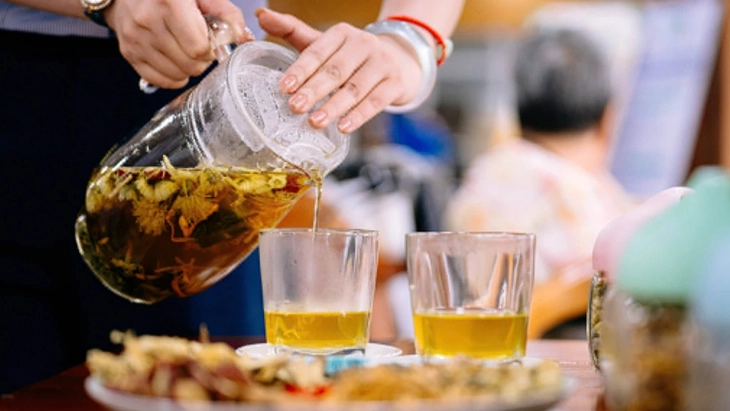
Consumers need to choose tea products that have been licensed for circulation - Photo: THANH HIEP
On e-commerce platforms, these products are often advertised with a series of attractive uses such as weight loss, beautiful skin, good sleep, even supporting disease treatment...
Doctors and traditional medicine experts warn that country of origin is a prerequisite for teas, but most online tea sellers do not disclose this information.
Mass sales of weight loss, detox, and skin-beautifying tea
Prices for tea range from a few tens of thousands of dong for a small package to several hundred thousand dong for products advertised as “high-end”, “imported” or “family heirloom”. Some products are even labeled “100% natural” or “no preservatives” to instill confidence in buyers.
However, behind that convenience and diversity are many risks regarding product quality, origin of raw materials, and improper usage, which can affect health if not carefully researched.
On an e-commerce platform, cordyceps products are advertised as "premium quality", "dried, large, delicious fibers, high-end body tonic" priced at 9,000 VND per 20g package.
The "beautifying skin, reducing acne, and beautifying" tea is listed as containing ingredients such as ginger, brown sugar, red apples, wolfberries, rose buds... priced at 6,500 VND/package, and is recommended as suitable for women with dull, dark, dry skin, acne, cold hands and feet, menstrual cramps, irregular menstruation, headaches, anemia...
Along with that, a series of sellers take advantage of many platforms to live stream, share their experiences, and encourage customers to order on the spot. This popularity shows that the demand for herbal tea and beauty tea is increasing, but at the same time, it also poses challenges in controlling the quality and reliability of products in the online environment. Some people have bought poor quality, moldy, and damaged products without knowing it.
Having believed in and bought herbal tea on social networks, Ha Phuong (Tan Binh ward, Ho Chi Minh City) had a rather negative experience.
"While surfing Facebook, I was accidentally suggested a herbal tea livestream, with a very attractive promotional price. After hearing the seller continuously emphasize the benefits of beautifying the skin and anti-aging, I decided to buy it to try, but when I opened the box, I saw that many of the ingredients were crushed, crumbly, and had a very unpleasant smell," Phuong recounted, saying that in the end she had to throw away the whole box for fear of affecting her health.
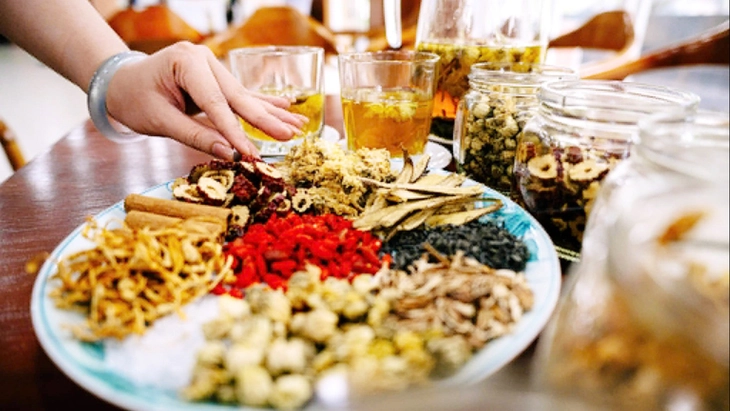
Consumers need to choose tea products that have been licensed for circulation.
Beware of hype
Speaking to Tuoi Tre , Dr. Truong Thi Ngoc Lan, Deputy Director of the Ho Chi Minh City Institute of Traditional Medicine, said that the use of tea has been around for a long time. Nowadays, more and more people are looking to buy tea through social networks, the most popular being herbal tea and beauty tea.
These products are often advertised with a series of attractive uses such as weight loss, skin beautification, sleep support, even disease treatment support. Meanwhile, the origin, ingredients and quality of these products are not clearly announced.
Many online retailers do not provide basic inspection criteria, potentially affecting the health of users. More worrying is the trend of consuming "handmade" tea, which poses many risks due to the lack of standards for food hygiene and safety and the preservation of medicinal herbs. People who make tea at home often do not have medical expertise, and can easily mix the wrong ingredients.
According to regulations, products must comply with the standards of the 5th edition of the Vietnamese Pharmacopoeia, or if not yet in the Pharmacopoeia, the production facility must develop and comply with its own quality standards. Teas also need to be checked for humidity, mold, bacteria and expiry date. If not stored properly, especially during the rainy season, tea can become moldy, wormy and unsafe to use.
Drinking tea also needs the right dose, right person
Doctor Huynh Tan Vu - lecturer of the Faculty of Traditional Medicine, University of Medicine and Pharmacy (HCMC) - said that tea is divided into two main groups: tea extracted from tea plants and herbal tea, not extracted from tea plants (chrysanthemum, rose...).
The ideal time to drink tea is in the morning (to stay awake) and in the afternoon (to relax), about twice a day. Avoid drinking tea at night so as not to affect your sleep and absolutely do not drink tea that has been left overnight.
Regarding herbal tea, Dr. Ngoc Lan noted that using this tea is not simply about brewing it every day, but requires attention to dosage, time, brewing tools and users.
Doctors note that people with stomach problems, malnutrition, high blood pressure, heart disease, or fever, women during menstruation, menopause, and breastfeeding... need to be careful when drinking tea. It is best to consult a doctor before use.
Supervision is still loose, how to choose safe tea?
Dr. Ngoc Lan said that using tea of unknown origin and unsafe can cause consequences ranging from mild to severe. At a mild level, tea does not bring the desired effect at all, only wasting money. However, more dangerous is the risk of poisoning due to tea contaminated with mold, worms or containing inappropriate preservatives such as sulfur.
In addition, using the wrong type of tea for your body type can also cause adverse reactions. For example, people with hot bodies should not drink hot teas such as ginger tea or ginseng tea because they can easily cause hot flashes, acne or insomnia.
The Ho Chi Minh City Institute of Traditional Medicine has received and treated a case of a diabetic patient who drank bitter melon tea, even though it was of good quality, but drank it too often and in high doses, leading to dangerous hypoglycemia.
"Herbal tea is not a safe drink for everyone. It will always be suitable for someone and not suitable for someone," Dr. Lan emphasized.
According to Dr. Lan, the quality control and supervision of tea on the market is still lax, especially for products sold online, where online sellers never specify who is not allowed to drink the product, only advertising its benefits.
Meanwhile, medical facilities must comply with strict bidding procedures, requirements for origin and quality standards. Even after purchasing, hospitals still have to request re-testing and bear the testing costs, although it is difficult to get reimbursed. The drug testing center also comes to collect samples for annual periodic testing.
Faced with the reality of a diverse tea market but difficulty in controlling quality, Dr. Lan recommends that consumers choose pre-packaged tea products from licensed businesses.
Do not buy "homemade" tea or hand-carried goods because there is no guarantee of origin and safety. If you want to use tea to support treatment, you need to consult a doctor to choose the right type of tea, especially do not use it in parallel with Western medicine because it can cause interactions or reduce the effectiveness of treatment.
Source: https://tuoitre.vn/tra-dep-da-thai-doc-ban-tran-lan-hieu-qua-muc-nao-20251026231436184.htm




![[Photo] National Assembly Chairman Tran Thanh Man receives Chairman of the House of Representatives of Uzbekistan Nuriddin Ismoilov](https://vphoto.vietnam.vn/thumb/1200x675/vietnam/resource/IMAGE/2025/10/27/1761542647910_bnd-2610-jpg.webp)

![[Photo] Party Committees of Central Party agencies summarize the implementation of Resolution No. 18-NQ/TW and the direction of the Party Congress](https://vphoto.vietnam.vn/thumb/1200x675/vietnam/resource/IMAGE/2025/10/27/1761545645968_ndo_br_1-jpg.webp)

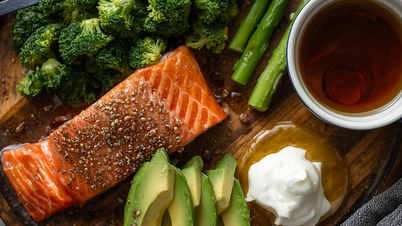




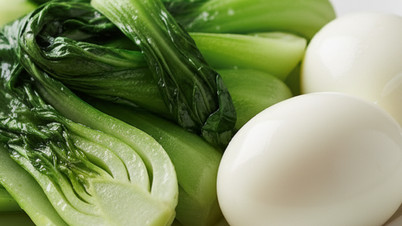










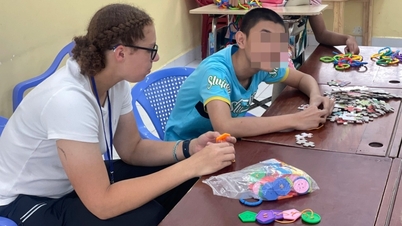







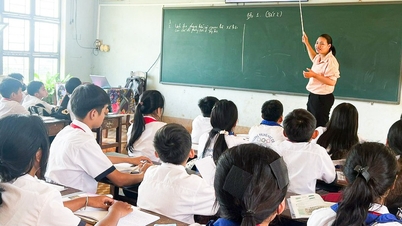






















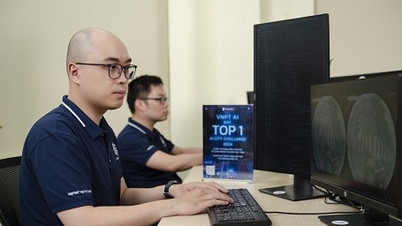























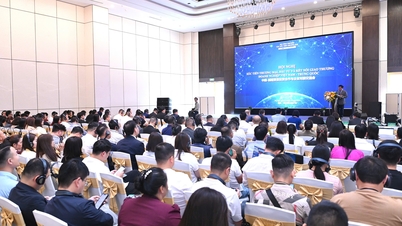

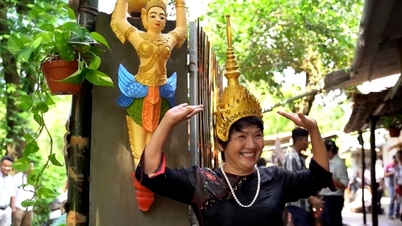


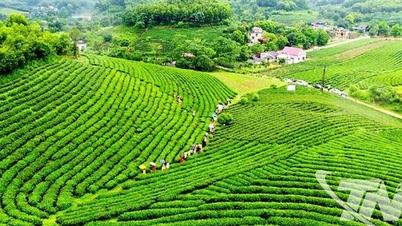



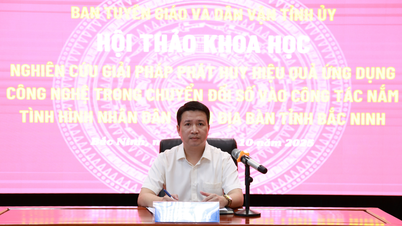

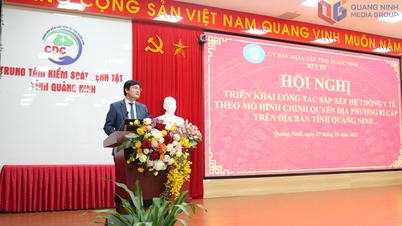



















Comment (0)